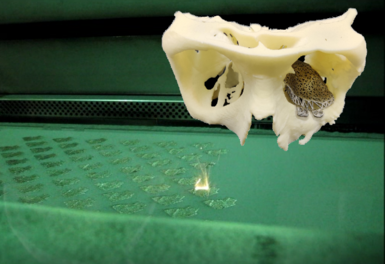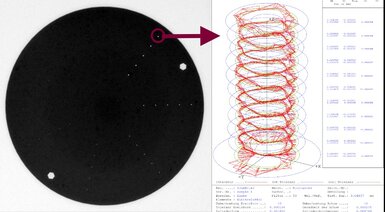News
Measurement traceability for 3D printed medical implants
EMPIR project brings measurement traceability to additively manufactured medical implants that have the potential to revolutionise medicine
The use of implanted medical devices to replace, repair or support the normal function of the human body has been one of the greatest medical successes of the 20th Century.
Improvements in such things as maxillo-facial implants and knee joint replacements are set to continue and way to do this is by the use of additive manufacturing (AM). Also commonly known as 3D printing this technique allows custom implants to be specifically tailored to patient needs, including grafts that promote bone growth as well as clinical guides that help surgeons.
However, this technology has advanced at a much faster pace than existing regulations and quality controls. Until recently there was a lack of knowledge about the areas of measurement uncertainty in the chain - from the generation of the part to the final implantation in the patient.
The European Metrology Programme for Innovation and Research (EMPIR) project Metrology for additively manufactured medical implants (MetAMMI, 15HLT09) brought together experts from national measurement institutes, medicine and academia to address this measurement need.
The project achievements include:
- Fabricating more than 100 additive manufactured medical implants, guides and standard objects using AM technologies which were successfully characterised by project partners including Aalto University, VTT MIKES, BAM, Lithoz, Medicrea, FH ÖO, DFM, LNE, CNRS, NSAI and FAU. To do this over 200 destructive and non-destructive measurements were performed using techniques such as X-ray computed tomography (XCT), terahertz computed tomography (THz-CT) or the use of coordinate measurement machines (CMM).
These results have now been incorporated into a Good practice guide for medical XCT image acquisition and analysis. This guide includes information on the use of computed tomography imaging for patients in medicine and in dentistry, along with recommendations on how to handle the medical images acquired. - These partners, along with DTU, BEGO, LNE and Mathys, also characterised various parts manufactured using different materials and additive manufacturing technologies to provide feedback to the manufacturing chain to enable process chain corrections to be implemented.
Results have now been incorporated into a second good practice guide ‘Detection and Prevention of Geometrical Deviations in Additively Manufactured Medical Implants’.
The quantification of the build-up of errors from each part of the whole implant chain, from manufacture to eventual clinical use was examined for:
- Maxillo-facial implants (VTT MIKES, Aalto University, Helsinki University Hospital)
- Dental guides (SKBS, PAS, PTB, BEGO)
- Spinal implants (UNOTT)
- and Cranial implant (SKBS, PTB)
The results of this work has been summarised in the document ‘Report on case studies: demonstrating the errors related to each manufacturing step from medical imaging to patient application’
As well as the guides this highly successful project has also published over 13 publications in scientific journals.
Anne-Francoise Obaton who coordinated the project said about the work:
“Scientific collaborations in such a consortium with partners from the medical sector, NMI and academia from all over Europe is very beneficial to clearly identify the needs from the medical sector, and share expertise and work to meet its needs”.
For the first time measurement traceability is available for 3D printed medical implants – which will enable the medical technology sector to benefit from this innovative manufacturing technique, an important step towards increased access to high-quality, low-cost medical devices across Europe.
This EMPIR project is co-funded by the European Union's Horizon 2020 research and innovation programme and the EMPIR Participating States.
Want to hear more about EURAMET?
Sign up for EURAMET newsletters and other information
Follow us on LinkedIn and Twitter
Information
- EMPIR,
- Health,
Developing quantum electric current standards to underpin digital transformation more
Creating a metrological infrastructure to monitor biomethane for use in transportation and gas networks more
Memristive devices that can be used as resistance standard or can be used for computing applications more
Supporting the digital transformation in Europe by monitoring the detail detection sensitivity of iCT measurements more
Validated, SI-traceable reference methods and materials to assess trace elements in discarded goods more






